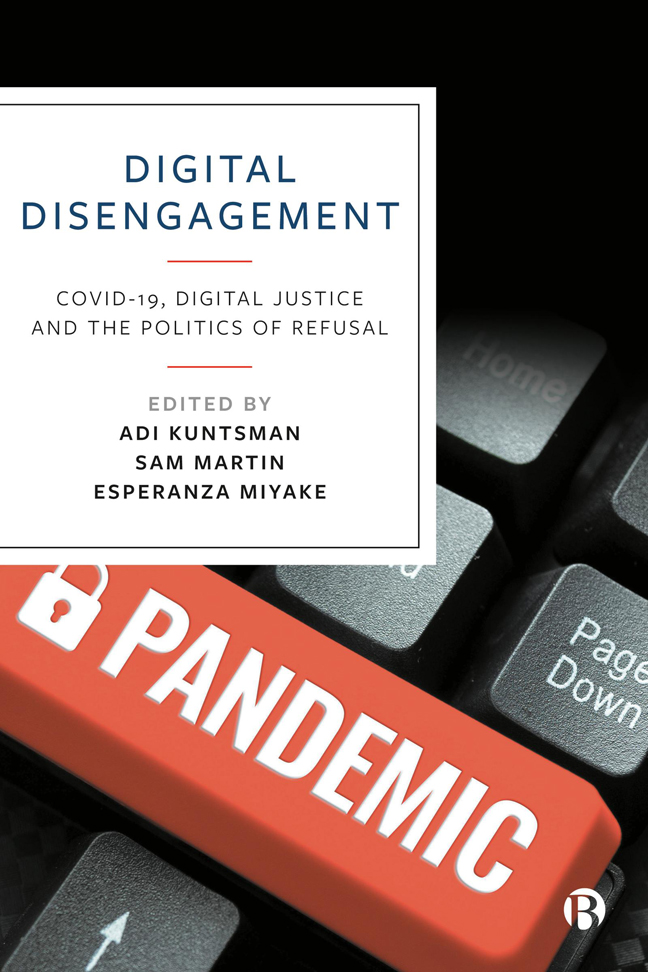Book contents
- Frontmatter
- Contents
- Notes on Contributors
- Introduction
- One En/forcing the Tokyo 2020 Olympics: The Racialization of Digital Engagement and Digital Solutionism
- Two Digital Engagements and Work–Life Balance in Creative Labour
- Three ‘#RoeVsWadeOverturned: Any Idea How Fast Your #PeriodtrackingApp Can Lead To Jail?’: Digital Disengagement and the Repeal of Roe vs Wade
- Four #SnailMailRevolution: The Networked Aesthetics of Pandemic Letter-Writing Campaigns
- Five Data Minimalism and Digital Disengagement in COVID-19 Hacktivism
- Six Digital Solutionism Meets Pandemic Imaginaries
- Seven State Violence, Digital Harms and the COVID-19 Pandemic: Imagining Refusal, Resistance and Community Self-Defence
- Epilogue: Digital Disengagement – Questions of Pandemic and Post-Pandemic Digitalities
- Index
Five - Data Minimalism and Digital Disengagement in COVID-19 Hacktivism
Published online by Cambridge University Press: 25 January 2024
- Frontmatter
- Contents
- Notes on Contributors
- Introduction
- One En/forcing the Tokyo 2020 Olympics: The Racialization of Digital Engagement and Digital Solutionism
- Two Digital Engagements and Work–Life Balance in Creative Labour
- Three ‘#RoeVsWadeOverturned: Any Idea How Fast Your #PeriodtrackingApp Can Lead To Jail?’: Digital Disengagement and the Repeal of Roe vs Wade
- Four #SnailMailRevolution: The Networked Aesthetics of Pandemic Letter-Writing Campaigns
- Five Data Minimalism and Digital Disengagement in COVID-19 Hacktivism
- Six Digital Solutionism Meets Pandemic Imaginaries
- Seven State Violence, Digital Harms and the COVID-19 Pandemic: Imagining Refusal, Resistance and Community Self-Defence
- Epilogue: Digital Disengagement – Questions of Pandemic and Post-Pandemic Digitalities
- Index
Summary
Introduction
Technological solutionism is appealing, especially during a crisis forcefully asserted to be ‘unprecedented’ (Milan, 2020; Taylor, 2020; Yan, 2020). The global spread of COVID-19 triggered an avalanche of initiatives promising digital solutions for tackling the pandemic and its impact on societies (Budd, 2020; Madianou, 2020). Typically, the retrieval and analysis of personal, health-related data were/are at the heart of these initiatives (Breuer et al, 2020; Lucivero et al, 2020; Hoffman, 2021). Amidst the flurry of governmental and corporate actions, civic organizations warned that ‘efforts to contain the virus must not be used as a cover to usher in a new era of greatly expanded systems of invasive digital surveillance’ (Civil Society Statement, 2020). Among those signing the statement were hacker communities such as the Honduran Barracón Digital Hacklab and the German Chaos Computer Club.
This chapter explores activism – aka ‘hacktivism’ (Jordan, 2002; Jordan and Taylor, 2004; Milan, 2013; Tanczer, 2016; Maxigas, 2017; Galli, 2018; Romagna, 2020) – among such hacker communities, opposing digital solutionism in times of the COVID-19 pandemic and advocating for ‘data minimalism’ as a means of digital disengagement. Hacktivism, a portmanteau of hacking and activism, refers to the ‘politically motivated use of technical expertise’ (Milan, 2015: p 550) and has been described as ‘activism gone electronic’ (Jordan and Taylor, 2004: p 1). I focus on the case of the German Chaos Computer Club (CCC), notably its hacktivism early on during the COVID-19 pandemic (from 2020 to 2021). Conceptually, I relate the notion of digital disengagement (Kuntsman and Miyake, 2019) to data minimalism (Loesing et al, 2010; Vitale et al, 2018; Kaufmann, 2020). In doing so, this chapter emphasizes informed, purposeful strategies for digital disengagement through data minimalism, observed among a hacker association that is known for high levels of digital skills and tech-political expertise.
Especially early on during the pandemic, Germany was among the Western European countries most severely affected by COVID-19. Despite a comparatively wellfunded and resilient health system, even in terms of capacities and equipment in intensive care units, hospitals and other healthcare providers were significantly strained due to the pandemic (Rieg et al, 2020). In response, manifold technological initiatives emerged, aiming and claiming to mitigate the impact of COVID-19.
- Type
- Chapter
- Information
- Digital DisengagementCOVID-19, Digital Justice and the Politics of Refusal, pp. 103 - 127Publisher: Bristol University PressPrint publication year: 2023



